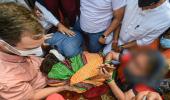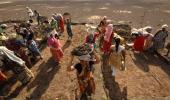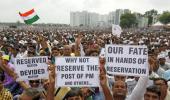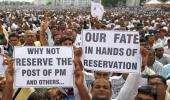This step by the Modi government is in the right direction and will go a long way in safeguarding the interests of socially and economically backward communities, asserts Professor T V Kattimani, Vice-Chancellor, Central Tribal University, Andhra Pradesh, Vizianagaram.

Social Justice defended by the Constitution can only be achieved by protecting the rights of weaker sections of society.
No doubt Babasaheb Ambedkar is the champion of the policy of social inclusion. As he knew, we can achieve social justice only by ensuring social inclusion.
Social inclusion through education is one of the innovative efforts of Indian democracy.
However, the SCs, STs, OBCs, women, and specially-abled people who have been exploited and remained oppressed for centuries need exceptional help and support to join the mainstream in our society.
When the due support is given, the students from these communities excel in their education and life skills.
This is manifested in the success of several policy decisions taken by the governments in this direction.
For instance, the residential hostels for SCs and STs and Ekalavya schools for tribal students of the hill areas play a pivotal role in spreading education among the oppressed communities of the country.
Dr Ambedkar calls upon the people to educate, unite and agitate for their rights.
Reservation in education, employment and promotion has given tremendous opportunities in society.
With the aid of reservation, the people who have grown up from scratch, play an important role in administration, education, science and technology, research, and innovation.
This includes students from rural and remote hamlets in hilly villages, who are first-generation learners from their community and villages.
Reservation to specially-abled persons and transgender people, which is the contribution of the Narendra Modi government, has created a sense of huge security and empowered the socially excluded communities.
Students from the oppressed communities are always good in social science education but lag in STEM education because most first-generation learners are from non-English, mother tongue backgrounds.
Therefore, the Government of India, especially the department of science and technology, has extended scholarships, fellowships, special training, workshops, teachers training, in-house programmes to prepare the students for the STEM stream, which has raised the number of students of this group who are excelling in science and technology.
The decision of the Union Cabinet to implement 27 per cent reservation in all-India medical education is a significant step toward attaining Babasheb Ambedkar's mission and aspiration of providing social justice to the backward and marginals in society.
Babasaheb proposed education as an empowering and emancipatory tool for the backwards and marginals in India.
It will provide the capacity to grow and live with dignity in the Indian democratic society.
In this inclusive action, Prime Minister Modi is trying to implement the Indian Constitution in a real sense, and that is what Babasaheb aspired.
Implementing 27 per cent reservation in medical education in its all-India quota is very much an apprsciable move in two ways:
It will provide space for OBC communities and economically weaker sections (EWS) in medical education, dental education, paramedical education etc.
And further, it will generate employment opportunities for the students of OBC communities in the fast-growing health sector.
The pandemic has exposed the vulnerabilities in our health sector and the imperatives of a massive number of trained medical experts, technocrats, medical service providers willing to work in the health sector in rural India.
This inclusive decision of the Modi government will create a substantial medical force in the country by ensuring that 5,550 students of OBC communities will enter medical education every year.
The all-India quota scheme consists of 15% of total available UG seats and 50% of total available PG seats in government medical colleges.
By the direction of the Supreme Court, 15% reservation for SCs and 7.5% of reservation STs was introduced in 2007.
The 27% reservation for OBCs was introduced to involve central educational institutions.
However, there was no provision for OBCs and EWS in medical education.
The Modi government, by extending reservations to 37 per cent in medical education by including OBC and EWS for the first time, has brought these sections within the ambit of the medical profession.
The number of medical seats was increased from the year 2021-22 to accommodate the additional seats from reservation.
This step by the Modi government is in the right direction and will go a long way in safeguarding the interests of socially and economically backward communities.
This prime minister's decision is a changemaker that will lead to a self-reliant medical sector in India.
Feature Presentation: Aslam Hunani/Rediff.com










